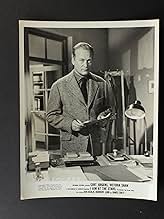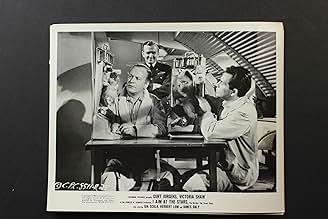AVALIAÇÃO DA IMDb
6,2/10
302
SUA AVALIAÇÃO
Adicionar um enredo no seu idiomaThe story of rocket scientist Dr. Werner von Braun's career, from the 1920s until the late 1950s.The story of rocket scientist Dr. Werner von Braun's career, from the 1920s until the late 1950s.The story of rocket scientist Dr. Werner von Braun's career, from the 1920s until the late 1950s.
- Direção
- Roteiristas
- Artistas
Don Burnett
- Newspaper Reporter
- (não creditado)
Paul Carpenter
- Launch Countdown Coordinator
- (não creditado)
Arpad Diener
- Horst
- (não creditado)
Avaliações em destaque
The quip I've heard was "I Aim at the Stars -- but I hit Antwerp and London". More V-2's were targeted at Antwerp than London, it being a major port used by the Allies during the invasion of Europe.
Von Braun's relation with the Nazis was Faustian -- he was obsessed with space travel, and developing liquid-fueled rockets was a first step. The V-2 (A-4 was the military's designation) was actually counterproductive to the Nazi war effort, and von Braun no doubt realized that (as Hitler did not). It was not a practical weapon, being expensive to produce and burdensome to launch. Few actually reached their targets; more tonnage was delivered by one Allied air raid than all the V-2's carried.
Von Braun's relation with the Nazis was Faustian -- he was obsessed with space travel, and developing liquid-fueled rockets was a first step. The V-2 (A-4 was the military's designation) was actually counterproductive to the Nazi war effort, and von Braun no doubt realized that (as Hitler did not). It was not a practical weapon, being expensive to produce and burdensome to launch. Few actually reached their targets; more tonnage was delivered by one Allied air raid than all the V-2's carried.
Producer Chares H Schneer (Jason and the Argonauts '63) assembled a variety of talented people for his space-age story of rocket scientist Wernher Von Braun. It follows portions of Braun's life from his youth in Germany, his war research service with the Nazis - through to his 'capture' and being seconded to the US space research program.
Screenplay writer Jay Dratler (Laura'44) strikes a deft balance in the moral argument between whether or not great scientists, who create technologies used in war, should be held responsible for the deaths of innocent bystanders - or should they simply be regarded as perfecting new technological developments for future progress? In this case, it was Wernher Von Braun's determination to perfect a rocket to eventually carry man into space. Whatever your moral stand, the brilliance of this man's brain cannot be denied.
German-born Curt Jurgens makes for a perfectly cast Von Braun. Jurgens was openly critical of Nazism and was interned in a Nazi Labour Camp for the 'politically unreliable'. He escaped and went into hiding - after the war, he became an Austrian citizen. In a long and distinguished career, he appeared in over a hundred movies and numerous stage plays. Though this film was shot in Munich it features a varied international cast including Australian actress Victoria Shaw, playing Braun's wife.
Director J. Lee Thompson (The Guns of Navarone'60) was blessed to have Wilkie Cooper selected by Schneer to guide principle photography, helping to create the films solid visuals. Cooper, one of Britain's most gifted directors of photography had worked with many of the world's acclaimed directors Including Hitchcock and Cardiff. His visual design excellence gave many of Ray Harryhausen's great animation epics (Jason and The Argonauts '63, etc) their strong images. Respected British composer Laurie Johnson provides an interesting music score.
Actual footage from failed Rocket test launches (both in Germany and the USA) capture the devastatingly destructive power and huge expense of these pioneering days in space exploration.
Screenplay writer Jay Dratler (Laura'44) strikes a deft balance in the moral argument between whether or not great scientists, who create technologies used in war, should be held responsible for the deaths of innocent bystanders - or should they simply be regarded as perfecting new technological developments for future progress? In this case, it was Wernher Von Braun's determination to perfect a rocket to eventually carry man into space. Whatever your moral stand, the brilliance of this man's brain cannot be denied.
German-born Curt Jurgens makes for a perfectly cast Von Braun. Jurgens was openly critical of Nazism and was interned in a Nazi Labour Camp for the 'politically unreliable'. He escaped and went into hiding - after the war, he became an Austrian citizen. In a long and distinguished career, he appeared in over a hundred movies and numerous stage plays. Though this film was shot in Munich it features a varied international cast including Australian actress Victoria Shaw, playing Braun's wife.
Director J. Lee Thompson (The Guns of Navarone'60) was blessed to have Wilkie Cooper selected by Schneer to guide principle photography, helping to create the films solid visuals. Cooper, one of Britain's most gifted directors of photography had worked with many of the world's acclaimed directors Including Hitchcock and Cardiff. His visual design excellence gave many of Ray Harryhausen's great animation epics (Jason and The Argonauts '63, etc) their strong images. Respected British composer Laurie Johnson provides an interesting music score.
Actual footage from failed Rocket test launches (both in Germany and the USA) capture the devastatingly destructive power and huge expense of these pioneering days in space exploration.
A passe hagiography of the life of Werner von Braun, a great rocket engineer with a questionable past. It's original title was "I Aim For the Stars." The best line I ever heard about this film was: "I aim for the stars, but sometimes I hit London."
This movie describes the life of Wernher Von Braun very well. It also gives relevant historical background on man's early forays into space. It is a good movie for anyone who is interested in the development of the science of rocketry because this man was highly instrumental in developing the Saturn V booster which took man to the moon in the late 1960s. I have been trying to find a VHS version of this movie without success so if anyone knows of where I might obtain it your suggestions would be appreciated.
As the world turned its attention to the possibilities of manned spaceflight Werner von Braun acquired a sufficiently high profile to be the subject of a movie, with the film that emerged getting a hostile reception in a Britain still bearing the scars wartime bombing (von Braun had himself ruefully admitted "We aim at the stars, but sometimes we hit London").
After playing Ernst Udet in 'The Devil's General' Curt Jurgens was for the next few years Hollywood's favoured personification of The Good German; which is why when a whitewash was required of von Braun Curt was the man they enlisted.
The central part of the film plays like the director's next film 'The Guns of Navarone' from the point of view of the Germans. Physically Jurgens was all wrong for the part (Braun was a much younger man for starters). The Holocaust is briefly alluded to but the film tactfully skirts the issue of his enthusiastic use of slave labour.
The later section when he takes over at White Sands to help the Americans in Korea is far less well known and is therefore more informative. And then it's up and away into the heavens.
After playing Ernst Udet in 'The Devil's General' Curt Jurgens was for the next few years Hollywood's favoured personification of The Good German; which is why when a whitewash was required of von Braun Curt was the man they enlisted.
The central part of the film plays like the director's next film 'The Guns of Navarone' from the point of view of the Germans. Physically Jurgens was all wrong for the part (Braun was a much younger man for starters). The Holocaust is briefly alluded to but the film tactfully skirts the issue of his enthusiastic use of slave labour.
The later section when he takes over at White Sands to help the Americans in Korea is far less well known and is therefore more informative. And then it's up and away into the heavens.
Você sabia?
- CuriosidadesAccording to the American Film Institute: "The film was greeted with demonstrations against von Braun at showings in Europe and New York, according to various news stories. Prior to the world premiere in Munich, von Braun and Jurgens held a press conference during which members of the Communist and British press hounded von Braun with charges that the film whitewashed his war work. The press conference prompted von Braun to issue the following statement: 'I have very deep and sincere regrets for the victims of the V-2 rockets, but there were victims on both sides. A war is a war, and when my country is at war, my duty is to help win that war.' Later, a crowd of protesters mobbed the theater where the premiere was held. Demonstrators in London dropped anti-Nazi pamphlets onto theatergoers from a balcony. In New York, the film was picketed by an anti-Fascist youth organization. The film was previewed in Washington at the Senate Office auditorium, and its Oct 1960 opening in Washington was attended by First Lady Mamie Eisenhower and the chairman of the Joint Chiefs of Staff. The film was chosen to open the Edinburgh Film Festival, where it received a special diploma of merit."
- Erros de gravaçãoDuring the Allied bombing raid on Peenemünde, dive-bombers are heard. No such aircraft would have been used.
Principais escolhas
Faça login para avaliar e ver a lista de recomendações personalizadas
- How long is I Aim at the Stars?Fornecido pela Alexa
Detalhes
- Data de lançamento
- Países de origem
- Idiomas
- Também conhecido como
- I Aim at the Stars
- Locações de filme
- Empresas de produção
- Consulte mais créditos da empresa na IMDbPro
- Tempo de duração
- 1 h 46 min(106 min)
- Cor
- Proporção
- 1.85 : 1
Contribua para esta página
Sugerir uma alteração ou adicionar conteúdo ausente

































